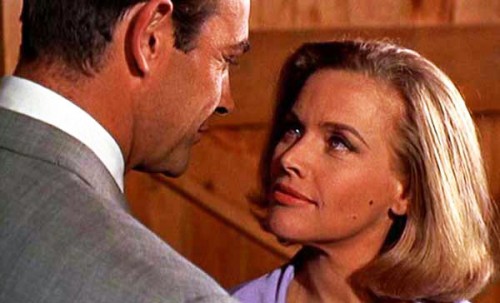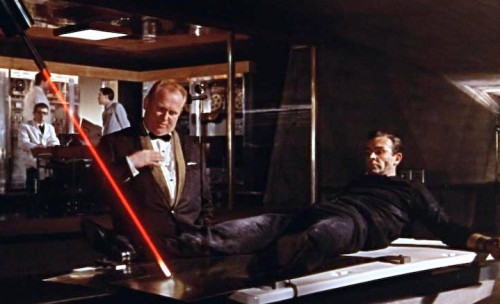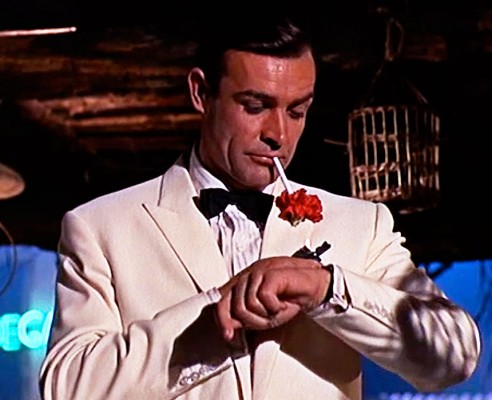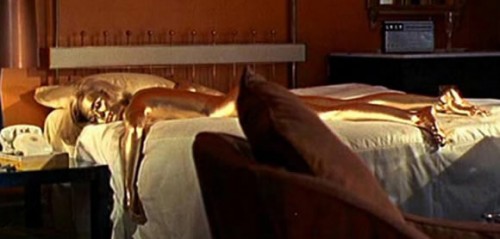i.
FIFTY YEARS AGO this summer, Goldfinger, the third and best James Bond movie, was released, cementing 007’s status as pop culture icon. It was, and remains, one of my all-time favorite movies, despite what I now recognize as its blatant anti-feminist subtext. Lately I’ve been thinking about Goldfinger: why I liked it originally, why I still like it, and why I feel the need to qualify my liking of it by mentioning, up front, its anti-feminist subtext.
In one of the film’s first scenes, our hero—played by Sean Connery, still the most manly actor to portray Bond, and the best—is cavorting by a pool at a Miami Beach luxury hotel with a pretty young thing named Dink, when he is interrupted by his hapless CIA counterpart, Felix Leiter. After politely introducing Dink to Felix, Bond says, “Say goodbye to Felix, Dink.” Then he pats her on her derrière and shoos her away, explaining: “Man talk.” It is the sort of sexist scene that, in 2014, makes us post-PC males cringe.
This is the last we see of Dink, although during the rest of the picture, Bond’s incredible powers of seduction will be on full display. He is not a superhero, as such, but his preternatural sex appeal functions no differently than Superman’s X-ray vision. No female can resist the lure of his hairy-chested man-might. Miss Moneypenny, the prim-and-proper secretary, exchanges barbs with him but cannot consummate the promise of carnality renewed every time his hat lands suggestively on her coat rack; she will spend the duration of the film franchise chastely waiting for him to marry her. Jill Masterson will leave the eponymous villain Auric Goldfinger for him, spend one night in his woolly embrace, and suffer Death by Gold Paint. Bond will not shag Jill’s sister Tilly—she is too shrill, too annoying, and anyway she dies too quickly—but he will seduce the ridiculously named Pussy Galore, airplane pilot and chief villainess. Indeed, the salvation of Fort Knox and the defeat of Goldfinger depends on “Poo-see” (as Connery pronounces it) betraying her master—which she is convinced to do, we are told, by virtue of 007’s magical semen coursing around her uterus.
But Bond doesn’t really seduce Pussy Galore, who, for all her obvious allure, gives off a strong not-interested-in-men vibe. What really happens is far uglier. First, he engages in a judo match with her. Then he forces himself upon her. Only when he has won, when he has her pinned down and beaten, does she relent to his kiss. “I appealed to her maternal instincts,” Bond will quip at the end, explaining how he changed her mind. Thus acquaintance rape saves the day.
ii.
On July 2, 1964, two months before Goldfinger’s release, Congress passed the landmark Civil Rights Act of 1964. Title VII of that act, among many other things, codified (some) equality for women. This did not end sexism, of course, any more than it ended racism. But for the first time, the United States explicitly stated that discrimination based on gender was unlawful.
What would 1964 James Bond have thought of Title VII? One can imagine him snickering, as many men must have snickered at the notion that women were equal to men. Certainly his pillow talk with Dink did not cover landmark civil rights legislation. Meanwhile, Auric Goldfinger’s two principal employees are Oddjob, a mute Korean, and Pussy Galore, who is probably a lesbian and certainly a woman. In other words, Goldfinger’s embodiment of evil, one of the all-time great cinema villains, has not discriminated based on race, color, gender, country of origin (he himself is British, remember, not American), disability, or sexual orientation—and disability and sexual orientation were not protected classes under Title VII. Goldfinger was more progressive than the lefties who enacted the Civil Rights Act! And he pays the price for his liberalism. Pussy Galore is as bad-ass as any guy, but it is that appeal to her “maternal instincts”—that is, Bond’s reducing her to her biological role as baby factory—that turns the tide and saves the day. Had the rogue pilot been a swaggering swinger named Dick Galore, 007’s sexual prowess might not have been so effective.
Also telling is the film’s most iconic and oft-imitated scene. Bond is bound, legs spread, on a table made of solid gold. Goldfinger turns on a laser, which slices through the gold, working its deliberate way up the table and between 007’s legs—straight for the source of his power, his phallus: the Bondian equivalent of Samson’s hair. For the only time in the movie, we see the unflappable Bond flap. Then comes this classic bit of dialogue:
Bond: Do you expect me to talk?
Goldfinger: No, I expect you to die.
The symbolism could not be more obvious. This is not the United States and the United Kingdom versus some insidious bad guy. This is women and foreigners and gays and non-whites and the disabled attacking—gasp!—manhood itself.
iii.
In 1964, Margaret Chase Smith (R-Maine) and Maurine Brown Neuberger (D-Oregon) were the only women in the United States Senate—the seventh and tenth woman, respectively, ever to serve in that hallowed body. There were 12 women in the House, making a total of just 14 females in all of Congress. Which is not surprising when you consider that women had only been granted the right to vote in 1920.
From the passage of the Civil Rights Act, the march toward gender equality has become a sprint. While straight white men like me still enjoy a position of privilege in the United States, our power has been slowly eroding for 50 years. There are now 98 women in Congress, many in the Cabinet, four on the Supreme Court, and one who is the likely Democratic candidate for president in 2016. Women make far more money than they did fifty years ago, are better educated, hold positions of power in business and government and academe and the arts and even the military, have become the breadwinners in far more households.
This is all as it should be. A society benefits when the greatest number of people are given the greatest amount of opportunity, as any gander at the Muslim world clearly demonstrates. Why does a country like Saudi Arabia lag behind the West in so many areas? Because its women are wasting their collective energy trying to convince their pigheaded husbands to let them drive cars…while we have Danica Patrick.
But the rise in standing of women is not without its consequences. The most marked, for me, is the confusion resulting from the blurring of traditional gender roles. The old way was misogynist (and racist and capitalist and homophobic), but it had the virtue of simplicity. For better or worse (mostly worse), we knew damned well what it meant to be a man in 1964. Today, for the first time since the invention of the plow, that meaning is in flux.
Feminists female and male point out, not incorrectly, that men have been oppressing women for much of recorded history. But as the philosopher Ken Wilbur notes in A Brief History of Everything, leveling the playing field is a more complex process than it seems. “It appears there were certain inescapable circumstances that made ‘patriarchy’ an unavoidable arrangement for an important part of human development,” he says, “and we are just now reaching the point where that arrangement is no longer necessary, so that we can begin, in certain fundamental ways, to ‘deconstruct’ the patriarchy, or more charitably balance the books between the male and female value spheres. But this is not the undoing of a brutal state of affairs that could easily have been otherwise; it is rather the outgrowing of a state of affairs no longer necessary.”
It is naïve to think that what took tens of thousands of years to develop can be undone in half of Sean Connery’s lifetime—and astonishing to think that we have come as far as we have.
iv.
Born eight years after its release, I did not see Goldfinger until the late 70s or early 80s, probably in the wood-paneled basement of my great uncle Frank, a former Marine who enlisted the day after Pearl Harbor. In that redoubt, the men of the family would smoke and watch TV while the women prepared the meals upstairs.
Part of me loves Goldfinger because it reminds me of being in that room, the safest place I can possibly imagine, ensconced in cigarette smoke and love and Gary Cooper-style masculinity. (This also explains my love of football). But there are plenty of movies I watched there—Death Wish and Dirty Harry and First Blood—that do not have the same resonance. I did not identify with or much admire Harry Callahan or John Rambo or any of the MIA soldiers played by Chuck Norris. Those men were gorillas, devoid of depth, incapable of restraint, able to articulate their feelings only through violence. Try as I might, I could not imagine myself as a muscle-bound, sub-verbal killing machine.
Bond was another story. He was charming, smart, glib, refined, well-dressed, expert at intricate casino games of the kind not popular in the dumbed-down United States. He knew what drinks to order and could hold his liquor. He was handsome and manly but in a normal, non-steroidal way. He dispatched the bad guys cleanly, with panache. A trail of blood did not follow in his wake. Above all—and quite unlike Dirty Harry or Rambo—he was good with women. He approached them with fearless confidence, if not outright swagger, and he thrilled them with clever badinage and boundless expertise. His charm was indefatigable. He treated them with what I then interpreted as respect; he would stop his mission of saving the world dead in its tracks to spend a few extra minutes in his ladyfriend’s embrace. There was also a modesty to Bond, a Victorian sense of propriety, that I found reassuring (I was a bashful kid). The sex in Goldfinger is only hinted at; the most we see is Connery leaning in for a fully-clothed kiss, checking the chill of his Dom Perignon. The violence is either implied or else ridiculous—the thug dispatched by an electric fan in the bathtub, Oddjob frying by touching his hat, Goldfinger himself being sucked out of the airplane window. Bond was in many ways a conservative figure. This was something I could get behind. Nothing could turn the adolescent me into Rambo, with his ripped pecs and his bloodlust and his grunts. But I could be James Bond. At least, it seemed more attainable, something to strive for. All I needed was a tuxedo, a working knowledge of baccarat, a taste for gin, and an unlimited expense account.
I grew up with the women’s rights movement. The very month I was born saw the release of Free to Be…You and Me, in which Rosie Grier, whose masculinity was not in question, informed us boys that it was alright to cry. The antiwar movement that peaked when I was a baby was the first time in American history that great numbers of men rejected the traditional role of warrior. George McGovern, who lost the election a week before I was born, received the Democratic nomination largely because of his staunch antiwar position. The notion of gender equality was hammered home during my (excellent, in hindsight) education. I was taught to be sensitive, to look for and rail against racism and sexism (but not yet homophobia), to be critical of the existing system. I applied to schools at a time when the watchwords were diversity and inclusivity, when colleges were actively seeking more women and minorities—and fewer white guys like me. In 1990, this confused and sometimes enraged me. I felt discriminated against. I was being asked to surrender power I never felt I had, and certainly never got to take advantage of. Or so I told myself, in the cozy bedroom of my two-parent split-level, in the affluent whiteness of my suburban hometown.
v.
Goldfinger is the best Bond movie. This is not just my opinion, but the general consensus among 007 aficionados. All subsequent installments strive and fail to recapture the film’s magical mixture of action, playfulness, innocence, and camp. After Goldfinger, Bond slowly became a caricature of himself, his adventures violating more overtly the “implausible but not impossible” mantra of the franchise’s producers. The violence became more graphic, the special effects more spectacular, the scripts less fun and more politically correct. The Daniel Craig films fail not because they lack for action (there’s too much action, frankly) or slick weaponry or nefarious villains or clever one-liners. They fail because M is a woman, and Moneypenny dies, and Great Britain is no longer the supreme world power, and Bond is suffering from PTSD and he looks like an egregiously hunky Chippendale’s dancer. There should never be an instant in a Bond film where we in the audience wouldn’t gladly change places with 007. Goldfinger, more than any of the other installments in the franchise, fully realizes this.
The key to Bond’s appeal is simple: he does not function in the real world—a truism that has escaped the franchise’s custodians for the last 25 years. These films are not supposed to be realistic. At all. This is made clear by the playful, wink-wink names of the characters. Auric Goldfinger, Oddjob, Pussy Galore, and Miss Moneypenny are clearly not real people.
The 007 franchise is spy fantasy writ large. Keyword: fantasy. The cinematic James Bond is not George Smiley. He’s not supposed to internalize. He’s not supposed to have qualms. We don’t want to see him being tortured in a North Korean prisoner of war camp, or mourning the loss of a loved one for more than the 15 seconds of screen time necessary to indicate that his desire for vengeance has been whetted. His assignment is not supposed to be colored in shades of gray. He’s licensed to kill, and he’s supposed to kill, and drink martinis without effect, and bang every gorgeous woman within a 20 foot radius of him. He’s a force of good, about this there should be no doubt, and before the credits roll, he must dispatch the villain in as creative a way as possible—and then bed said villain’s woman. There should be no larger consequences of his actions beyond The Good Guys Win. He is not a New Age man, an eater of quiche, a feminist in any way form or shape. In short, James Bond is the cinematic embodiment of the (straight, white, conservative) male id, warts and chest hair and all.
If I were given the keys to the Aston Martin that is the Bond franchise—and there is no creative project I would rather have control over!—I would make it a period piece. It would forever be 1964, the villains would flash advanced technology like shoebox-sized cell phones and lasers, Bond would drink dry martinis and fell foes and flirt with an army of Dinks who would coo “Oh, James!” at his every witticism. I love this idea. I feel strongly that it would be great, in spite of (because of?) its blatant anti-feminist subtext.
The question is: why? Why do I have such a soft spot for Goldfinger?
The point of the franchise (other than to generate revenue) is to let straight white dudes of greater refinement than Chuck Norris pretend that we are still masters of the universe, a male-chauvinist fantasy now socially acceptable only in hip hop lyrics. We have to pretend, because our influence is fading. We are like Bond’s homeland in 1964: still powerful but no longer the main superpower, our glory days in that Aston Martin’s rearview mirror. Perhaps the film satisfies some deep-seated, conservative sliver of myself, one I’m loath to cop to at parties, the tiny piece of me that cheered when John Roberts wrote that the only way to not discriminate against race is to not discriminate against race.
Understand: the temptation to throw in the towel and flip the dial to Fox News is very, very powerful for white males of a certain age. I’m in that demographic now, and I must be vigilant. More than anything else, Rush Limbaugh and Bill O’Reilly and their ilk represent white men not going quietly. However ugly the spew billowing forth from their jowly maws, the underlying message is the same: Not so fast, buster; we haven’t surrendered yet. When liberals attack Rush, when advertisers drop him for calling Sandra Fluke a slut, it doesn’t stop him; it merely reinforces his the-world-is-against-us narrative. Rush Limbaugh is a living, breathing Custer’s Last Stand.
A rarely-discussed byproduct of the civil rights movement is that it is difficult to process the death of “white male privilege” when you happen to be a white man, especially if you know intellectually that it must die, if you endorse its death politically. This is something women—or perhaps anyone protected under Title VII—cannot fully understand. It’s peculiar to us straight white guys. It is, as Bond put it, man talk.







As always, a really interesting, thoughtful read…
I think it IS hard in certain ways to know how to “do” masculinity now. White masculinity in particular.
My family has always been particularly female-heavy. Two daughters, a mother, and an opera-loving, formerly asthmatic father. On my mom’s side, out of ten cousins, there are two boys.
So it was with some amount of consternation that we discovered, in the fall, that my sister was pregnant with a boy. What would we DO with him?
Now that Rahm is fully four months, Hannah has decided the time is ripe to impress certain lessons on him. “I tell him,” she said to me, “A drunk ‘yes’ is not a ‘yes.'”
That’s one way to do it, I guess.
But it is, as you suggest, hard.
I remember being in women’s studies classes in college and talking about the desirousness of breaking down traditional gender categories. Of arranging the world in some other way, rather than pink and blue. And I’d agree, wholeheartedly. But then my imagination would fail. Because, really, what would come next?
It’s a brave new world, for all of us-
With such a cool name, and all those women around him, Rahm will be just fine, methinks.
Thanks for reading, Marni!